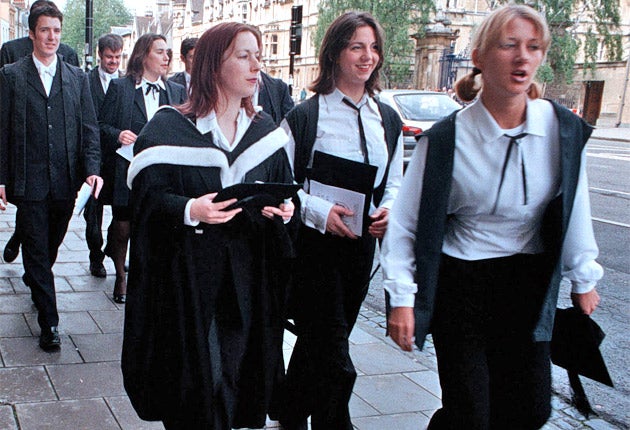Universities have their work cut out to improve social mobility
Reducing fees is one solution, but universities should also reach out to young people from disadvantaged backgrounds while they are in school

Today’s report from Alan Milburn sets out what universities can do to advance social mobility in Britain.
They certainly have their work cut out. Children from poor neighbourhoods are far less likely to go to university than young people from wealthier families. Last year one in five school pupils were on free school meals – but only one in a hundred Oxbridge entrants were. This is a problem because if disadvantaged young people are unable to get degrees, they end up unable to access the top professions and find it harder to get on in life.
At the moment, the government tries to address this problem by lowering the university tuition fees that children from poorer neighbourhoods have to pay. Oxford University recently announced that a private donation from one of its alumni will be used to cut fees for these students from £9,000 to just £3,500.
While this is a laudable aim, it delays the support available to these students until it is too late. As recent research from IPPR shows, the gap in school results between children from different class backgrounds begins very early in life, and many have been put off the idea of university long before they sit their A-levels. This problem has been exacerbated recently, as a lot of support for teenagers has been withdrawn following abolition of the Education Maintenance Allowance, cuts to careers advice in schools, and cuts in sixth form funding.
Besides, students don’t actually pay back the cost of their tuition fees until after they have graduated and are in a job – which means the cost of tuition is less of a deterrent for people to apply to university than it first appears. The recent rise in tuition fees does not appear to have led to a drop in applications from pupils from poorer backgrounds.
So while cutting tuition fees for students from poorer backgrounds has superficial appeal, it may not be the best use of resources to ensure that these pupils go to university. In all likelihood it will subsidise students who would have gone to university anyway. A better approach is to ask what can be done to support teenagers while they are in school or college.
The obvious solution is to tackle the underlying problems, such as low attainment among poorer pupils in our schools and rising levels of child poverty and urban deprivation. But as Alan Milburn argues, this doesn’t let universities off the hook. In his words "the blame game – where universities blame schools, schools blame parents, and everyone blames the government – must end".
Universities can play an important role in supporting and developing teenagers with high potential. The resources they currently spend on lowering tuition fees could be better spent providing grants to teenagers who have a lot of academic potential but are at risk of dropping out of school for financial reasons. This could act as a replacement for the EMA which was proven to raise staying-on rates at sixth form.
They could also draw inspiration from the US Ivy League universities who use extensive outreach programmes to attract pupils from black and Latino communities. Harvard, for example, writes to every high achieving minority pupil in the US and Yale employs an outreach officer in every state. More could also be made of summer schools, where teenagers are brought into universities to both inspire them to apply and to help raise their academic performance to the required levels. And universities can provide regular sustained support and coaching with pupils in disadvantaged neighbourhoods.
Having provided more support to pupils when they are at school or college, universities must also address their admissions process. Well-qualified pupils from poorer neighbourhoods are still not being accepted to top universities – even when they have the potential to succeed. This could involve broadening the ways they select pupils and using contextual data for admissions.
Universities should step up to their responsibility to help students as they prepare and apply for university, not just support them with lower fees once they get in.
Jonathan Clifton is a Senior Research Fellow at IPPR.

Join our commenting forum
Join thought-provoking conversations, follow other Independent readers and see their replies